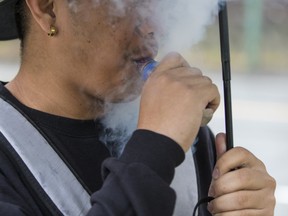
Article content
The public health vanguard in British Columbia is again showing the world how not to legislate on vaping. Attorney General Niki Sharma has just introduced Bill 24, which will enable her government to recover health damages attributable to vaping by both fining and suing vendors.
THIS CONTENT IS RESERVED FOR SUBSCRIBERS ONLY
Subscribe now to read the latest news in your city and across Canada.
- Exclusive articles from Barbara Shecter, Joe O'Connor, Gabriel Friedman, and others.
- Daily content from Financial Times, the world's leading global business publication.
- Unlimited online access to read articles from Financial Post, National Post and 15 news sites across Canada with one account.
- National Post ePaper, an electronic replica of the print edition to view on any device, share and comment on.
- Daily puzzles, including the New York Times Crossword.
SUBSCRIBE TO UNLOCK MORE ARTICLES
Subscribe now to read the latest news in your city and across Canada.
- Exclusive articles from Barbara Shecter, Joe O'Connor, Gabriel Friedman and others.
- Daily content from Financial Times, the world's leading global business publication.
- Unlimited online access to read articles from Financial Post, National Post and 15 news sites across Canada with one account.
- National Post ePaper, an electronic replica of the print edition to view on any device, share and comment on.
- Daily puzzles, including the New York Times Crossword.
REGISTER / SIGN IN TO UNLOCK MORE ARTICLES
Create an account or sign in to continue with your reading experience.
- Access articles from across Canada with one account.
- Share your thoughts and join the conversation in the comments.
- Enjoy additional articles per month.
- Get email updates from your favourite authors.
THIS ARTICLE IS FREE TO READ REGISTER TO UNLOCK.
Create an account or sign in to continue with your reading experience.
- Access articles from across Canada with one account
- Share your thoughts and join the conversation in the comments
- Enjoy additional articles per month
- Get email updates from your favourite authors
Sign In or Create an Account
or
Article content
Vaping is not a public health problem. It is the solution to a public health problem, a serious one, the damage done by tobacco. This dreadful bill stigmatizes and frustrates the solution. Its main effect will be to drive more of the industry underground.
Article content
Article content
Article content
People who break laws obviously should be punished. The challenge in writing laws about vaping is to strike a balance between the interests of adults — especially adults who smoke — and the interests of kids. We should put vaping out of reach of kids and punish people who sell to them. Nicotine is dependence-forming and we do not want children to acquire dependencies. Adults can make their own judgments.
Article content
By signing up you consent to receive the above newsletter from Postmedia Network Inc.
Article content
But it is smoke and tar that kill smokers, not nicotine vapour. Nicotine is not a carcinogen. Public Health England and the U.K.’s Royal College of Physicians have been telling us for a decade that e-cigarettes have at most five per cent of the toxins in cigarettes — a fact nine in 10 Canadians are unaware of. Research in countless studies reports that e-cigs are the most powerful off-ramp from smoking there is. If only smokers knew!
Article content
But back to British Columbia and its angelic government. Everyone in the nicotine trade knows that illegal products are ubiquitous and dirt-cheap, especially in Vancouver. Regular combustible cigarettes are extraordinarily easy to procure and vapes and oral pouches are becoming equally plentiful. In theory, B.C. and Ottawa have all the tools they need to pursue illegal vendors, whether in brick-and-mortar stores or online. On the other hand, most illegal cigarettes sold in B.C. are produced by gangs in First Nations communities. So enforcement may be tricky. All the more reason to go after the illegal market by making life easier for legal producers and sellers, not harder, as the government’s bill would do.
Article content
Article content
Alas, the vaping industry is not a neatly defined group of licensed producers dutifully submitting monthly reports to Health Canada or the Canada Revenue Agency who can be sued if they step out of line and commit a “vaping-related wrong.” If only it were that easy to get the bad guy: B.C. could rake in some revenue and make the world a better place.
Article content
Article content
But it is not that easy.
Article content
Consider disposable e-cigarettes, which are used for a week or so and then thrown out. Accounting for more than half of today’s market, they are all imported from China. Many carry false claims on their packaging — for example, “tastes like a 40-milligram nicotine concentration, but is in fact a 20-milligram concentration.” A check determines it really is a 40-mg concentration and is thus illegal. Then there are the knock-offs that imitate a legal brand, all brought in outside the legal sector by importers with business connections to China.
Article content
Vaping liquid is also in play, most of it produced legally at prescribed strengths. But in some First Nations’ communities you can find any strength in any flavour you want and products containing no or inappropriate excise stamps.

.jpg) 13 hours ago
3
13 hours ago
3
 English (US)
English (US)